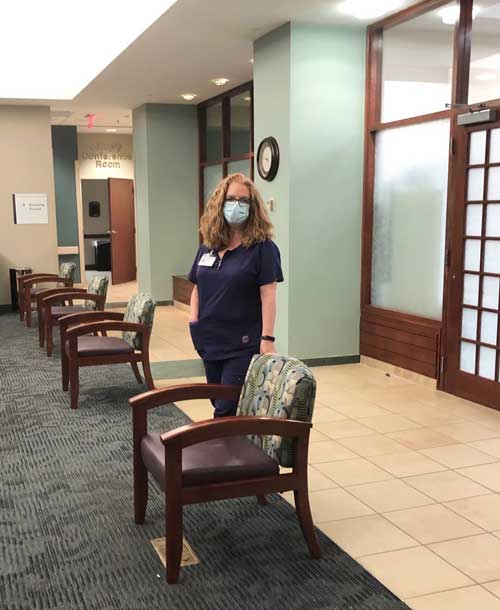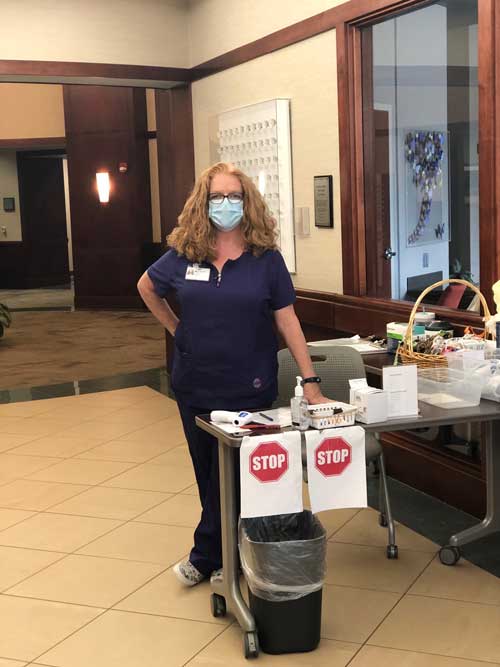Breaking down barriers
Stacy Sawyers is paving a path to care for cancer patients in need

Stacy Sawyers’ work puts her face to face with patients at one of the most challenging times of their lives. They’ve just been diagnosed with cancer, and yet, for various complex reasons, they are unable to get the care they need to wage a battle against the disease.
Sometimes they can’t afford the medication they’ve been prescribed. Sometimes they can’t pay for the gas it takes to drive to and from their treatments. Sometimes they’ve lost jobs and their access to health insurance.
Sawyers calls them barriers. She’s a cancer services support specialist at Novant Health Forsyth Medical Center’s Derrick L. Davis Cancer Center, and her job is to help patients overcome them, leveraging generous donations to provide the financial support necessary to push them forward in their cancer journey.
“It’s almost like being Santa Claus every day because I get to swoop in and take care of a barrier or remove a fear because of blessings from others,” Sawyers said.
Those blessings come courtesy of four different funds, established by private donors to help uninsured, under-insured and underserved patients pay for medication, travel, lodging and other household expenses: the Evans-Hopkins Fund, which is earmarked to support Kernersville-area patients who are being treated for breast cancer; the Andrew Griffin Fund, which is designated for urology patients; the Lee Simstein Memorial Fund, created to honor the work of Dr. Lee Simstein; and the Rebekah Fund, established in honor of Dr. Dawn Moose and focused on ensuring cancer patients have access to critical dental care.

Sawyers can access those funds to support patients, but that doesn’t mean what she does is easy. She often finds herself working with patients who are reluctant to receive help. For many, they don’t want to admit they can’t afford the care they need on their own.
Before COVID-19, Sawyers would ease their concerns and work to overcome the stigma in person.
“It was all face to face: Sit down, have a conversation, meet them on day one when they have no idea what’s around the corner and everybody’s worried about money. I get them to take a deep breath, and I tell them I’ll be next to them. I don’t have the answer to everything, but we’ll work through it together,” Sawyers said.
In the thick of the pandemic, those conversations had to happen by phone — a key difference for Sawyers.
“Even though I can have the same conversations, the eye contact or the pat on the shoulder really helps. It’s a lot easier to get someone to understand that I’m not judging them because they can’t afford their car payment when we’re talking face to face,” she said.
As the country has begun to open up, Sawyers is back in the cancer center, albeit 6 feet from her patients and hidden behind a mask. But she’ll take it, if it means getting back in front of the people who need her — because the need persists, in ways Sawyers couldn’t comprehend before she started this work.
Take, for instance, the Rebekah Fund. Originally, it was intended to serve head and neck cancer patients who must have dental evaluations before receiving radiation or chemotherapy. If they don’t have a healthy mouth, those treatments will create more damage to the mouth and the jawbone, Sawyers said. The preventive measure in those cases is removing teeth — in some cases, all of them.
“So not only have these patients been told they have cancer and that they need chemo and radiation, but there’s now a good chance they’ll have some of their teeth removed,” Sawyers said.
Those extractions are expensive.
“As staggering as this sounds, it is very easy to see — hold onto your seats — a $10,000 or more bill for those services. I have one patient who showed me his bill, and it was over $27,000. The average is $15,000, and there are a minimum of 12 patients a year who will need that money,” Sawyers said. “It is certainly an under-met need.”
And, as it turns out, it extends beyond just head and neck patients, which Sawyer learned recently when she met a 72-year-old patient with metastatic breast cancer. The woman couldn’t start a medication that would ease her pain and help her bone metastasis because it would kill her jawbone.
“I called her and talked to her and immediately fell in love with her. She talked about how she made sure her kids had good teeth and her husband had good teeth, but she never took care of herself,” Sawyers said.
The patient needed nine teeth pulled but couldn’t afford it. Sawyers got to work on a solution. She collaborated with Heather Egan, chief development officer of Novant Health Forsyth Medical Center Foundation, to ensure the donors behind the Rebekah Fund would agree to expand the scope of the fund. Then, she sent the patient to a dentist, who made it possible for her to begin taking the medication that will strengthen her bones and improve her quality of life.
And when the $2,600 bill came, Sawyers covered it, with donations from the Rebekah Fund.
“When we told the patient, she cried. She couldn’t believe that someone would do that for her,” Sawyers said. “The dentist emailed me after her visit and told me she was great. And I know he treated her like a queen.”
That was a good day, and those are the days that keep Sawyers going.
“Some days I come home and I just sit and stare for awhile, but typically I come home better than when I went to work because I receive a blessing from passing blessings on,” Sawyers said. “I just want our patients to know they are not alone. They have a champion.”
You can support that work with a donation to Novant Health Forsyth Medical Center Foundation.
You are an integral part of the remarkable care we provide. Make your gift today.